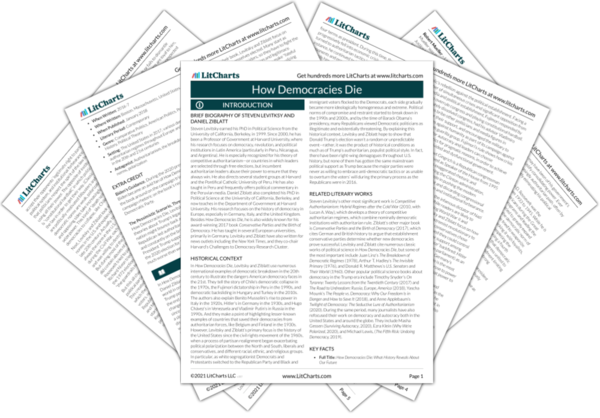Gatekeeping Quotes in How Democracies Die
Potential demagogues exist in all democracies, and occasionally, one or more of them strike a public chord. But in some democracies, political leaders heed the warning signs and take steps to ensure that authoritarians remain on the fringes, far from the centers of power. When faced with the rise of extremists or demagogues, they make a concerted effort to isolate and defeat them. Although mass responses to extremist appeals matter, what matters more is whether political elites, and especially parties, serve as filters. Put simply, political parties are democracy’s gatekeepers.

Unlock explanations and citation info for this and every other How Democracies Die quote.
Plus so much more...
Get LitCharts A+In short, Americans have long had an authoritarian streak. It was not unusual for figures such as Coughlin, Long, McCarthy, and Wallace to gain the support of a sizable minority—30 or even 40 percent—of the country. We often tell ourselves that America’s national political culture in some way immunizes us from such appeals, but this requires reading history with rose-colored glasses. The real protection against would-be authoritarians has not been Americans’ firm commitment to democracy but, rather, the gatekeepers—our political parties.
Because they select our presidential candidates, parties have the ability—and, we would add, the responsibility—to keep dangerous figures out of the White House. They must, therefore, strike a balance between two roles: a democratic role, in which they choose the candidates that best represent the party’s voters; and what political scientist James Ceaser calls a “filtration” role, in which they screen out those who pose a threat to democracy or are otherwise unfit to hold office.
These dual imperatives—choosing a popular candidate and keeping out demagogues—may, at times, conflict with each other. […] There is no escape from this tension. There are always trade-offs.












